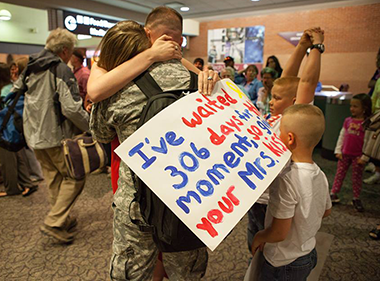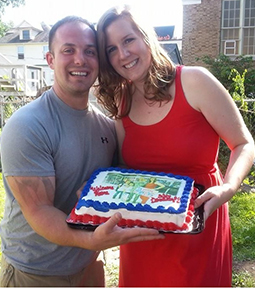For Husband and Community
 |
|
Army Reservist Chris Derrick, his back to us, is greeted at Albany Airport after his third and final combat deployment by his wife Raquel and sons Connor (arms up) and Carson. |
ALBANY, N.Y. (April 3, 2017) —When Army Reservist Chris Derrick was discharged in March 2015 after two tours of duty in Iraq and one in Kuwait, his wife Raquel thought their life was going to become something close to “normal.” Multiple combat deployments, the loss of his best friend to military suicide, and a transition out of the military after 12 years of service had left a toll, however.
“I hadn’t expected the invisible wounds that began to surface in the months that followed,” said Raquel, a Ph.D. candidate in the School of Criminal Justice (SCJ). Upon that realization, she and Chris embarked as a team on a mission toward his health and wellbeing, sharing in both challenges and successes.
“I provide care by managing Chris’ treatment regimen and helping him to navigate triggers and stress,” said Raquel. “It hasn't always been easy. But Chris is an incredibly strong and resilient person.”
Raquel’s own strength was recognized in March by the Elizabeth Dole Foundation through her inclusion in its 2017 class of Dole Caregiver Fellows — 31 military and veteran caregivers from across the country who have become leaders in their communities as public advocates for wounded, ill and injured veterans. Her story is now part of the foundation's HiddenHeroes.org campaign, which provides critical access to vetted resources, an online military caregiving community, and other support for military caregivers.
“One thing that is important for others to understand is that we are dealing with a generation of service members who have suffered from invisible wounds, namely Post Traumatic Stress Disorder and Traumatic Brain Injury,” said Raquel. “These injuries make it especially challenging to access help.”
A Need to Establish Community
Raquel felt isolated during Chris’s third tour of duty, from 2013-14 in Kuwait, when she was living in Albany with their two sons. “In general, there is less of a family community among reserve units because they tend to be more spread out geographically than active duty and National Guard soldiers,” she said “Further, we did not live near any major bases in the Albany area.”
 |
|
Chris and Raquel Derrick at their home in Hurley, NY, celebrating his return from Kuwait in 2015. |
An Army Reserve liaison from Maryland contacted her shortly after Chris deployed, but the liaison didn’t know what local resources and supports were available for military families. It turned out there were few accessible resources at all. Reserve families, said Raquel, “are often imbedded in a civilian community where there is a lack of understanding about the challenges that a family faces during a deployment and other military transitions.”
She set about to increase awareness about these challenges and encourage the Capital Region community to increase support for military caregivers “so that they don't need to feel alone in their military journeys.” She spread the word about military resources she’d used to aid her and her sons, allowing her to locate a “military culturally competent clinician” and obtain a grant to send the boys to summer camp.
With Chris’s return came a new test, one the couple is slowly but surely passing. “I'm really proud of Chris for taking the steps to be healthy,” said Raquel. “I'm honored to be beside him to celebrate his victories and also to help him traverse his challenges. He is doing great.”
SCJ Smooths the Path Ahead
Her next quest, abetted by her academic work in the SCJ, is to establish a nonprofit in the Capital Region: the Family Operating Base (FOB), “a peer support community for military and veteran families to connect over shared lived experiences and empower each other to access the resources available to address needs.” FOB will include specific programming directed toward veteran and military caregivers.
“As a result of my PhD training, I will establish a program evaluation of the FOB that will demonstrate the efficacy of peer supports for this population — a program that can be replicated throughout the country.”
She foresees the data generated by the FOB-served population illuminating practices and facilitating program improvement — a model she’s observed at UAlbany as a research assistant on the Service Outcomes Action Research (SOAR) Project, a collaboration between SCJ and two area youth residential treatment centers.
“SOAR is a very innovative approach to service delivery,” said Raquel. “The experience and training that I have gained will directly translate to the work I will do at the FOB.”
![]() For more news, subscribe to UAlbany's RSS headline feeds
For more news, subscribe to UAlbany's RSS headline feeds
A comprehensive public research university, the University at Albany-SUNY offers more than 120 undergraduate majors and minors and 125 master's, doctoral and graduate certificate programs. UAlbany is a leader among all New York State colleges and universities in such diverse fields as atmospheric and environmental sciences, business, education, public health,health sciences, criminal justice, emergency preparedness, engineering and applied sciences, informatics, public administration, social welfare and sociology, taught by an extensive roster of faculty experts. It also offers expanded academic and research opportunities for students through an affiliation with Albany Law School. With a curriculum enhanced by 600 study-abroad opportunities, UAlbany launches great careers.


